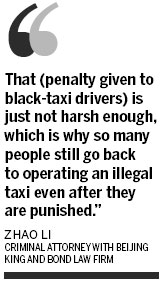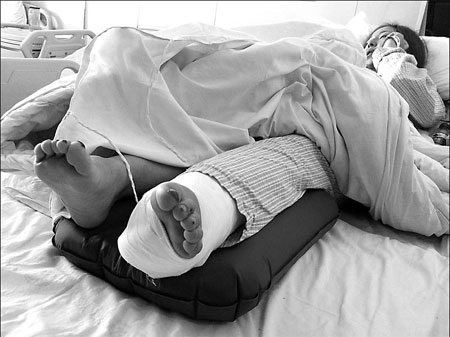Crackdown urged on illegal black cabs in Beijing
Updated: 2013-01-08 07:53
By Cao Yin (China Daily)
|
||||||||
|
A woman suffered fractures after jumping out of a black taxi on the morning of Dec 25 in Beijing. She was robbed and sexually assaulted by the driver of the illegal cab and another passenger. Yin Yafei / for China Daily |

Prosecutors say root of the problem is shady sales of secondhand cars
Legal experts have urged Beijing police to crack down on the illegal trade in secondhand cars and rogue repair shops, to cut the number of illegal black taxis, operating in the capital.
Procuratorates across the city report they have handled more than 158 cases related to black taxis since 2009, with prosecutors in Fengtai district trying 42 cases alone in the past year.
Charges have ranged from operating an unlicensed cab to intentional injury, robbery and rape, authorities said.
"The best way to tackle crimes or disputes arising from black taxis is to target the root cause, and that's the illegal sale of secondhand cars," said Wang Tingting, a prosecutor from Chaoyang district.
She said that thousands of vehicles are changing hands on the black market and that it was proving hard for police to keep track of them, explaining that many end up on the city's roads as unlicensed cabs.
All legally registered cars have their number plates registered in the capital's database, and Lu Xianping, who manages a secondhand car dealership in Fengtai, said the city has strict regulations for people buying used vehicles.
Buyers need to hand over their ID cards and driving licenses, while their details and those of sellers will also be recorded in the dealer's computer.
"However, deals on the black market are often made without a paper trail," he said.
"Some cars that were actually sent to be scrapped are even finding their way back into the market, which doesn't help."
What also makes things harder for police is when a driver repaints a vehicle to look like a genuine Beijing cab.
"People buy low-price cars from middlemen and then get counterfeit taxi licenses and plates, either from the same people or others who advertise such services," Wang said, adding that there are body shops that will re-spray vehicles with taxi colors and fit fake meters.
"Police should launch a campaign against black market sales, on top of their regular checks," she said. "The priority should be on taking down those who make and sell fake certificates."
A spokesman for Beijing Municipal Commission of Transport declined to comment on the enforcement of laws against illegal taxi operators.
According to information posted on the authority's website, however, crackdowns are regularly organized during major events, such as the National Day holidays.
The checks are often conducted around railway stations and in cooperation with the public security bureau, it added.
"There are gaps in enforcement, of course. The police can't cover all areas at the same time," Wang said, adding that black taxis are generally only discovered when a driver or passenger is the victim of an accident or crime.
"It's very unsafe for passengers, especially women, to take such cars at night or early in the morning," she warned.
"Some drivers are too strong for women to fight off, while some of these guys even get violent with police, when they are stopped for inspection."
Yan Li, a prosecutor from Haidian district, agreed that targeting the illegal sale of secondhand cars is the key to curbing the problem of black taxis, which "pose a real danger to the lives of residents and other drivers".
In July 2011, a woman was sexually assaulted and robbed of 5,000 yuan ($800) by a black-taxi driver close to the Sixth Ring Road. She had been returning home at about 4 am.
In another incident in Haidian district, Yin Guangming, a black-taxi driver, was tied up and robbed by two knife-wielding passengers as he drove near Sijiqing Bridge.
"Without insurance or safety equipment, such as GPS or an alarm, black-taxi drivers run an incredible risk," Yan said.
"Yet, even when something bad does happen, many of them stay silent and do not report it, as they are afraid of being prosecuted for running black taxis."
Massive demand
Although illegal, there is still a massive demand for black taxis in Beijing, particularly on the rural-urban fringes where there are large communities of migrant workers and public transport is scarce.
"Licensed cab drivers sometimes refuse to pick up passengers downtown if they're going to rural areas, especially on rainy days," one black-taxi driver told China Daily as he drove from Sanlitun to Wudaokou.
"I'm always willing to do business, although some passengers are too afraid to get in my car."
The driver, who did not want to be named, said he is from Heilongjiang province and did not want to break the law. However, like many migrants, he is barred from applying for a taxi license under city regulations, which requires all drivers to have Beijing hukou, a permanent residency permit.
Meanwhile, a genuine cabbie who gave his name as Shen said many black-taxi drivers are former license holders looking to boost their incomes.
"I pay my company more than 6,000 yuan a month (in rent), so I can only earn a little," he said. "That's why some drivers give up their jobs and turn to illegal operation."
Despite the argument made by many that black taxis fill a gap in the public transport system, legal experts largely agree they are bad for the capital.
Zhao Li, a criminal attorney with Beijing King and Bond Law Firm, said that if the supply of black taxis cannot be quickly cut, the authorities should increase the penalties for those caught behind the wheel of a black taxi.
At the moment, the maximum penalty is five years in prison and a fine.
"That is just not harsh enough, which is why so many people still go back to operating an illegal taxi even after they have been punished," he said.
caoyin@chinadaily.com.cn
(China Daily 01/08/2013 page4)

 In Photos: 7.0-magnitude quake hits Sichuan
In Photos: 7.0-magnitude quake hits Sichuan
 Li Na on Time cover, makes influential 100 list
Li Na on Time cover, makes influential 100 list
 FBI releases photos of 2 Boston bombings suspects
FBI releases photos of 2 Boston bombings suspects
 World's wackiest hairstyles
World's wackiest hairstyles
 Sandstorms strike Northwest China
Sandstorms strike Northwest China
 Never-seen photos of Madonna on display
Never-seen photos of Madonna on display
 H7N9 outbreak linked to waterfowl migration
H7N9 outbreak linked to waterfowl migration
 Dozens feared dead in Texas plant blast
Dozens feared dead in Texas plant blast
Most Viewed
Editor's Picks

|

|

|

|

|

|
Today's Top News
Live report: 7.0-magnitude quake hits Sichuan, heavy casualties feared
Boston suspect cornered on boat
Cross-talk artist helps to spread the word
'Green' awareness levels drop in Beijing
Palace Museum spruces up
First couple on Time's list of most influential
H7N9 flu transmission studied
Trading channels 'need to broaden'
US Weekly

|

|








